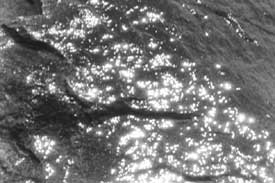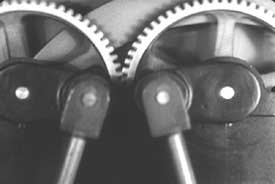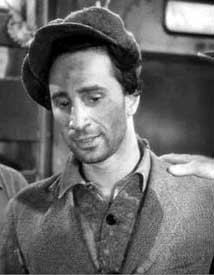The entire cast is credited with the production of the silent comedy Pie in the Sky (1935), including a young Elia Kazan, his first film. It opens with a count-down of the players, including a couple of them operating camera equipment. Ralph Steiner was the real director, but the leftist Public Theater collective was just prone to sharing equal credit.
At a time when films were escapist, & the Depression in full sway rarely mentioned in the cinema, Pie in the Sky is inescapably political as well as comical.
The title alludes to a popular song parody well-known to leftists of the Depression era, "Pie in the Sky;" aka, "The Preacher & the Slave," first published in the Industrial Worker'sİLittle Red Songbook (1911) & ascribed to Joe Hill, written to the tune of the gospel song "Sweet By & By," with verses critical of religion, government, & the medical community all of whom promised great things while people suffered without aid. The chorus runs:
"You will eat, bye & bye,
In that glorious land above the sky;
Work & pray, live on hay,
You'll get pie in the sky when you die"
which the hobos of this comedy sing at the climax, text provided so that the audience can sing along. The film's modernly added score is quite properly the tune to the hymn.
At a christian Mission preposterously pretending to assist the poor, hobos have gathered hoping to be fed, but are instead subjected to a moronic preacher's tiresome sermon. The homeless gents pull long faces, yawn, & nod off. At length they begin pounding on their empty plates.
Finally they get to eat pie, sliced sliver-thin, & even with such miniscule portions, the last two gents in line get nothing, & look pretty darned sad about it.
These hungry fellows (including Kazan in a pork-pie cap) set off through the dump with nothing but the preacher's sinister assurance, "The Lord will provide," but the Mission won't.
Kazan tries to eat bitter hawkweed. His companion fashions a pretzel out of a piece of wire. They find a seamstress's dummy & pretend it's Mae West. They climb into a wreck of a stripped jalopy to relax, smoke cigarette butts, then begin pretending to be driving along a bouncy road, a really beautiful moment.
Their day of hunger, homelessness, & friendship continues playfully at the dump, with several amusing incidents, leading to a patomime of visiting the Mission, where they're forced to listen to B-S then sent off still starving.
Obviously there are many who will dislike this twenty-two minute film merely because a pack of commies made it. But it's a startlingly good comedy, rebelliously unafraid of offending the religious or the right.
 Ralph Steiner's first film was the experimental short H20 (1929).
Ralph Steiner's first film was the experimental short H20 (1929).
It has been lionized by film historians & arty-farties with the dubious categorization of "cinematic tone poem."
It's included on the National Film Registry whose purpose is to preserve for posterity films of cultural, historical, or aesthetic importance.
What can I say. It wouldn't've been one of my top choices for a brouhaha. H20 shows various images of water, rain, drips, drains, sprays, fountains, hoses, watering devices, waterfalls, rivers, spillage, puddles, ditches, underside of piers, & so on for eleven or so gruellingly dull minutes.
It's good cinematography by a signal American photographer, but for my tastes a film needs to be more than an encyclopedia of images on a topic. It would make a nice projected lightshow to be ignored in the deep dark depths of a fern bar.
 Surf & Seaweed (1929/30) is a mated "sequel" to H20 is more of same, thirteen minutes of sea tides, surf, splashes, shores. Not as pretty as H20 but equally dull. Surf & Seaweed (1929/30) is a mated "sequel" to H20 is more of same, thirteen minutes of sea tides, surf, splashes, shores. Not as pretty as H20 but equally dull.
Mechanical Principles (1930) adds another ten minutes to Steiner's experimental cycle celebrating nuttin-much.
It moves as far from his nature photography as he could get in favor of a paeon to the piston-driven world of human invention & mechanical power.
Because there is indeed an "art sculpture" quality to circling gears & pounding pistons, Mechanical Principles is the least tedious of Steiner's early films.
And given the communist content of Steiner's first substantive films including Pie in the Sky, this one takes on a bit more meaning in the context of his romance of the worker.
copyright © by Paghat the Ratgirl
|


 Surf & Seaweed (1929/30) is a mated "sequel" to H20 is more of same, thirteen minutes of sea tides, surf, splashes, shores. Not as pretty as H20 but equally dull.
Surf & Seaweed (1929/30) is a mated "sequel" to H20 is more of same, thirteen minutes of sea tides, surf, splashes, shores. Not as pretty as H20 but equally dull.